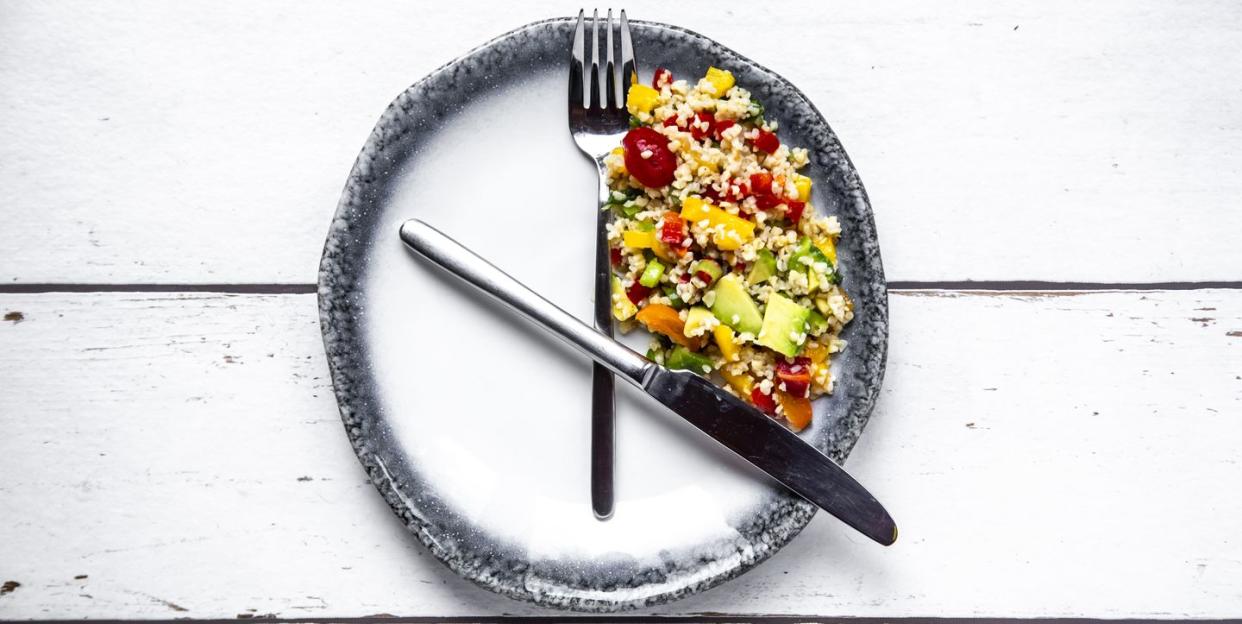What Is the 5:2 Diet and Can It Help You Lose Weight?

File under trends that won’t go away: the 5:2 diet, a type of intermittent fasting made popular by British broadcaster Michael Mosley and late-night host Jimmy Kimmel. Proponents claim it can decrease risk of chronic disease and promote weight loss. Plus, a few studies have even linked fasting to longevity. While the 5:2 diet may work for some people, it's certainly not for everyone. Here's what you should know before you get on board with this diet trend.
What is the 5:2 diet?
The 5:2 diet is a form of fasting where followers eat about 25% of their recommended calorie needs (about 500-600 calories) on two scheduled fasting days and then eat normally the other five days that week. People generally intersperse their fasting days (like planning them for Mondays and Thursdays) so they're not back-to-back.
Some followers take the 5:2 diet to an extreme by consuming zero calories on their fasting days. Others place restrictions on their non-fasting days by following a high-fat, ketogenic diet. You may have also heard of the 4:3 diet, which is the same concept but you are required to fast for three days instead of two.
What can you eat on the 5:2 diet?
There aren't any hard-and-fast rules about what to eat on the 5:2 diet, so you can essentially eat whatever you like on fasting days as long as it stays within the caloric limits. Typically, people will eat lower-calorie foods on their fasting days. These could include vegetables, fish, soup, eggs, and lean meat, plus zero-calorie beverages like water and black coffee or tea. You can eat up to three times a day on a fasting day. Since there isn't an official list of 5:2 diet foods or 5:2 diet recipes, you just have to keep track of your caloric intake rather than macronutrients and the like.

Can you lose weight on the 5:2 diet?
It really depends. The theory is that intermittent fasting (IF) limits the opportunities for eating and you’ll lose weight simply by taking in less calories overall. That's because many of us eat based on scenario, not hunger levels. For example, if you’re fasting during your Tuesday meeting that always includes fresh donuts, it may prevent you from eating a higher-calorie food you would’ve had otherwise. However, you could likely achieve the same goal by having a healthy snack about 30 minutes before your meeting and opting out of deep-fried, doughy treats simply because you’ve had something more nutritious ahead of time.
If you're in an overall caloric deficit for the week, then yes you'll likely lose weight. But this diet only controls caloric intake on two days of the week; the remaining five days of the week you have the ability to eat practically whatever you want so in the grand scheme of things, your caloric intake may not be substantially decreased at the end of the week to warrant weight loss.

Is the 5:2 diet good for your health?
Remember that there is no one-size-fits-all approach when it comes to diet and nutrition. The first red flag for me when reviewing the 5:2 diet is that 500 calories is just not enough food to sustain even your basic bodily functions at rest (translation: you'd practically pass out by eating that few calories in a day, especially repeatedly over time). You'll also want to be careful with exercise on those low-calorie days, since you likely won't be taking in enough fuel to power the workout. Plus, it's not enough food to supply even your daily needs of major vitamins and minerals; if you do choose to try the 5:2 diet, you'll at minimum want to start taking a multivitamin on the fasting days to compensate for the lack of nutrients you're getting through food.
When it comes to the fasting days, going for prolonged periods without eating can also prime you to overeat, creating a cycle that’s difficult to get out of because long-term fasting can mess with our body’s hunger cues and metabolism. The restriction can also create an unhealthy relationship with food, which is why this diet is especially not advised for people with active eating disorders or a history of disordered eating. This diet is also not indicated for women who are pregnant, nursing or trying to conceive. If you have a history of diabetes, hypoglycemia, or nutrient deficiencies, the 5:2 diet is not recommended.
If you are still intrigued by the diet and think it may work for you, my biggest piece of advice is to stick with nutrient-dense foods on fasting days that provide more volume. For example, a standard muffin at Dunkin Donuts is upwards of 500 calories; don't blow your entire day's worth of calories on one muffin please! Prioritize foods like vegetables and fruits which are high fiber and contain an ton of vitamins and minerals, as well as soups which are volume-based and can fill you up on fewer calories (not all soups are low-calorie though, check out our GH Nutrition Lab approved picks here). Choose lean protein sources that aren't fried or greasy, and make sure to stay hydrated throughout the day as well. The last thing you need is to blow your few fasting calories on soft drinks or fruit juice.
Is the 5:2 diet sustainable for weight loss in the long-term?
There is very little research on the 5:2 diet period, not to mention over an extended period of time. A gradual and moderate reduction in calories, coupled by stay hydrated and choosing more nutrient-dense foods, can lead to lasting sustainable weight loss over time. The 5:2 diet has some pretty extreme caloric fluctuations throughout the week. I'd argue for a more modest yet sustainable caloric reduction daily where you can still incorporate your favorite foods and not starve yourself. It makes me think of the phrase hara hachi bu, a Confucian saying recited before every meal in the community of Okinawa, Japan (which is considered a "blue zone"and is home to the longest-living women in the world). The phrase reminds Okinawans to stop eating when they are 80% full and helps to prevent overeating. Eating mindfully, staying hydrated, and planning ahead are your best secrets for weight loss/management success in the long-run.
The bottom line: To make better choices for health and weight loss, it’s simply not feasible for many of us to restrict food for days at a time. Life is too short to cut the number of days you're "allowed" to eat in a calendar year from 365 to 261 — especially if it stops you from doing other beneficial things, like getting regular exercise and enjoying meals with people you love. There’s more to nourishment than calories, so consider that before buying into any trendy diet or eating plan. Remember that, and you’re already on the right track.
You Might Also Like

